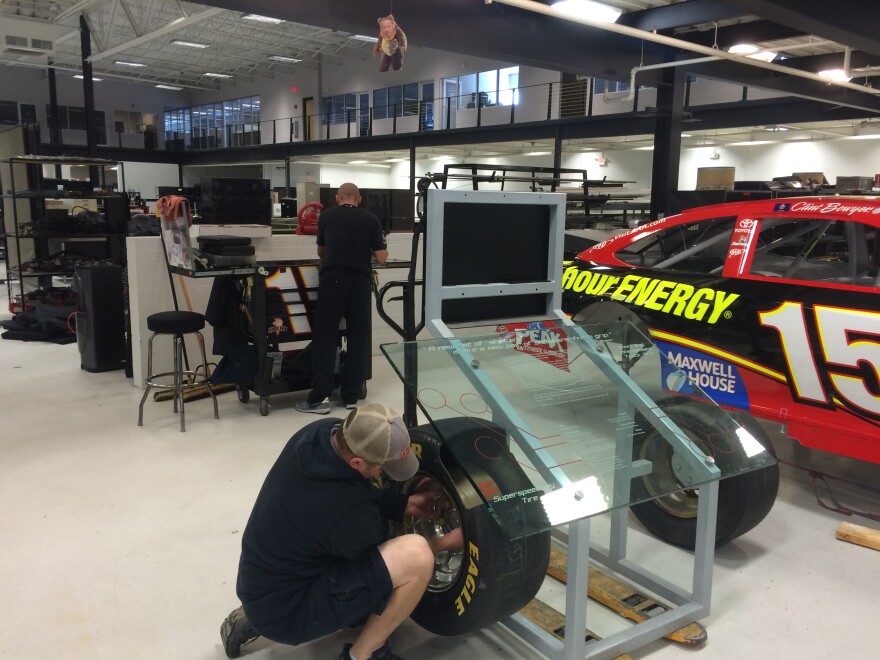As NASCAR begins its new season with the Daytona 500 this weekend, it’s making another big change to be more like other sports. Two years ago, NASCAR shifted from a convoluted points system to a winner-take-all playoff. This year, its racing teams will become more like NBA or NFL franchises rather than independent businesses.
Racing teams have been under the same business model since Harry Truman was president.
“This is a very complicated agreement to sort out with 60 years of history doing business in a certain way,” NASCAR CEO Brian France said at a press conference announcing the changes.
For decades, anyone could start a team and try to qualify for races. But that meant if you went out of business, you didn’t have an exclusive spot in a professional league to sell. All you had was stuff.
In Cornelius, employees recently reassembled a tire display at Michael Waltrip Racing. It’s for sale, like everything else here. Chief financial officer Larry Johns says the owners decided last year to close down.
“We are selling the assets piece by piece," he says. "We're selling as you affectionately call it 'stuff.'"
Car parts, workbenches, office chairs - everything worth anything. Johns says selling this way meant teams came nowhere close to recouping their original investment.
Luckily for Michael Waltrip Racing, it’s sort of on the fence between the old and new models. Veteran motorsports marketer Tom Cotter says under the new system, "there's an anchor point now."
"Your team has a value beyond the assets that you own, beyond the driver and beyond the sponsor," Cotter says.
That’s because NASCAR has created 36 charters (think: franchises) that are guaranteed spots in races. By limiting the supply of teams, executives hope to increase demand - and value - just like in other pro sports.
The charters were based on past performance, so Michael Waltrip Racing received two and sold them. The final price hasn’t been released, but co-owner Rob Kauffman gave this estimate when the charter system was announced:
"If you ask me right now, what do I think they're roughly worth, I would say single digit millions," he said.
That’s on top of the actual stuff the team is selling in Cornelius.
Still, it’s not much compared to what teams go for in other pro sports. Two years ago, the Los Angeles Clippers sold for $2 billion. But Kauffman says NASCAR studied more than sales figures.
"We were able to kind of look at the NFL, look at Formula One, look at soccer, look at cricket, every kind professional sport that's out there and what made them successful and what problems and challenges they had," he said, "and what parts could we use and mix and match, make work for us."
For example, NASCAR is not guaranteeing every spot in its races. There will be four open slots that non-charter teams can qualify for each weekend.
NASCAR is setting up revenue-sharing. That way charter teams have more predictable budgets.
And if a charter team finishes in the bottom three for three straight years, NASCAR can take its charter. It’s kind of like relegation in European soccer, but executive vice president Steve O’Donnell says NASCAR may not be as strict.
"Our goal is to have sustainable charters, and we don't want to be in the business of taking any away," O'Donnell says.
There will also be a Team Owner Council to give owners more input into NASCAR decisions. Co-owner Richard Petty says how it used to be, "it's sort of like the Democrats and Republicans."
"They've been doing their thing," he continues. "We've been doing our thing, meeting in the middle a little bit. We're getting rid of that. We're going to all be in the middle of the deal now."
Petty, whose long history in the sport cemented his nickname as The King, says the charter system is the second most important thing that’s ever happened in NASCAR.
Back at Michael Waltrip Racing, CFO Larry Johns says the charters will increase the value of race teams. But he makes clear that sponsorships are still key.
"Most of the teams, they would tell you that 80 percent of their costs have to be supported through sponsorship," he says. "That's what drives the sport today. That's what drives the sport even post charter. What the charter does though is it gives you an opportunity to reasonably predict what your income is going to be in that other 20 percent."
He says it’ll also help teams sign even bigger contracts with sponsors. After all, now their decal-covered cars are guaranteed to be in the race - on TV - every weekend.




